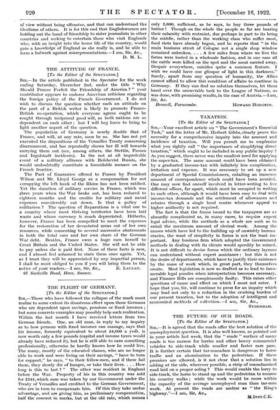THE PLIGHT OF GERMANY.
[To the Editor of the SPECTATOR.]
Suc,—Those who have followed the collapse of the mark must realize to some extent its disastrous effect upon those Germans who are dependent upon savings, pensions or fixed incomes ; but some concrete examples may possibly help such realization. Within the last month I have received letters from two German friends. One, an old man, in reply to my inquiry as to how persons with fixed incomes can manage, says that his income, formerly equivalent to about £4,000 a yea% is now worth only a few pounds (capital and income taxes would already have reduced it), but he is still able to earn something professionally, otherwise he hardly knows how he could live. The many, mostly of the educated classes, who are no longer able to work and were living on their savings, "have to turn for support," he says, "to their fellow-men, and if these fail them, they slowly die of hunger, or take their lives. . . . How long is this to last ? " The other was resident in England before the War. Property of his in this country was sold for £544,which sum was taken by our Government under the Treaty of Versailles and credited to the German Government, who are in turn to compensate him. Of this they take undue advantage, and are giving him, as preliminary compensation, half the amount in marks, but at the old rate, which means
only 5,600, sufficient, as he says, to buy three pounds of bUtter I Though on the whole the people so far are bearing their calamity with restraint, due perhaps in part to its being the middle, rather than the working class who suffer most, food riots have already begun, and he reports that "in the main business street of Cologne not a single shop window remained unbroken. . . . A few miles from where we live the farms were looted in a wholesale fashion, and in one case all the cattle were killed on the spot and the meat carried away. Despair everywhere, suicides quite a common feature. I wish we could have one glimpse of light in this darkness." Surely, apart from any question of humanity, the Allies cannot afford to allow this condition of affairs to continue in Germany. If they can find no solution themselves, let them hand over the unenviable task to the League of Nations, as was done, with promising results, in the case of Austria.—I am, Sir, &c.














































 Previous page
Previous page